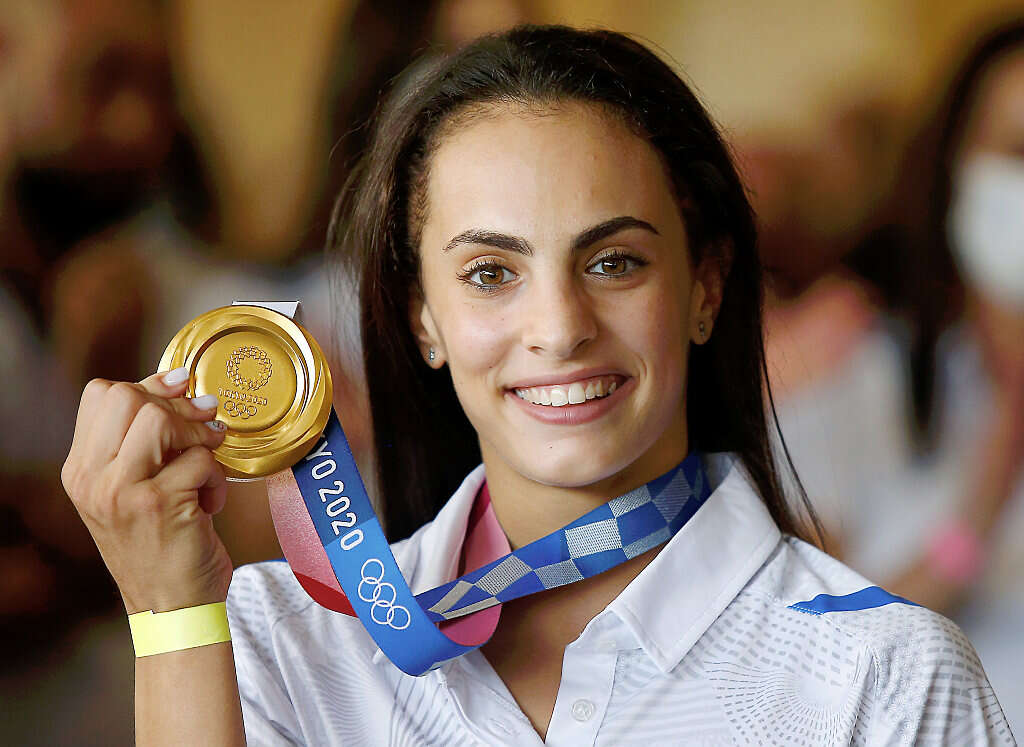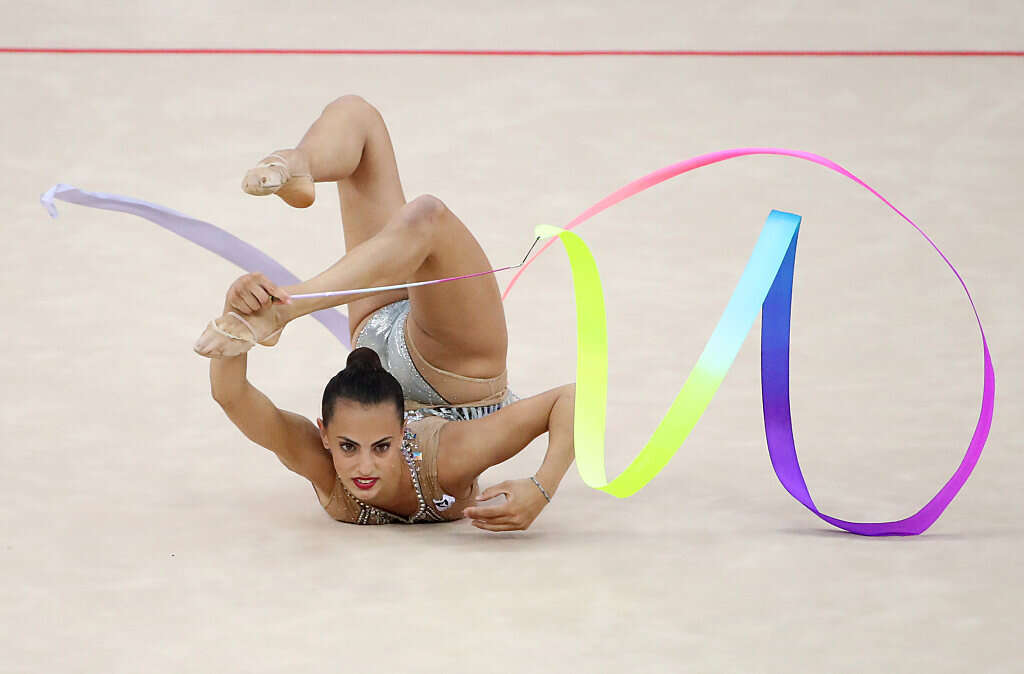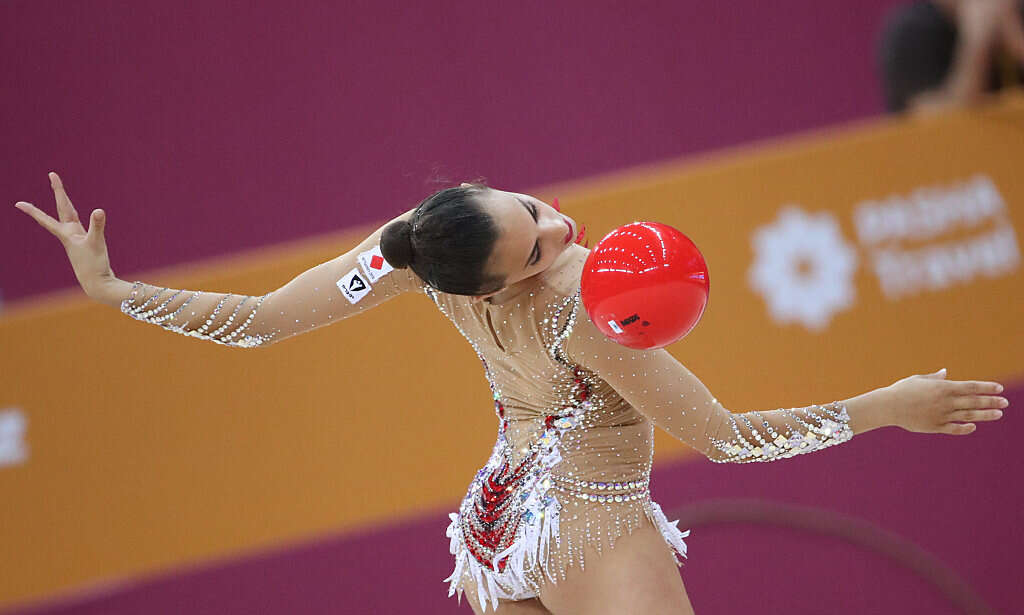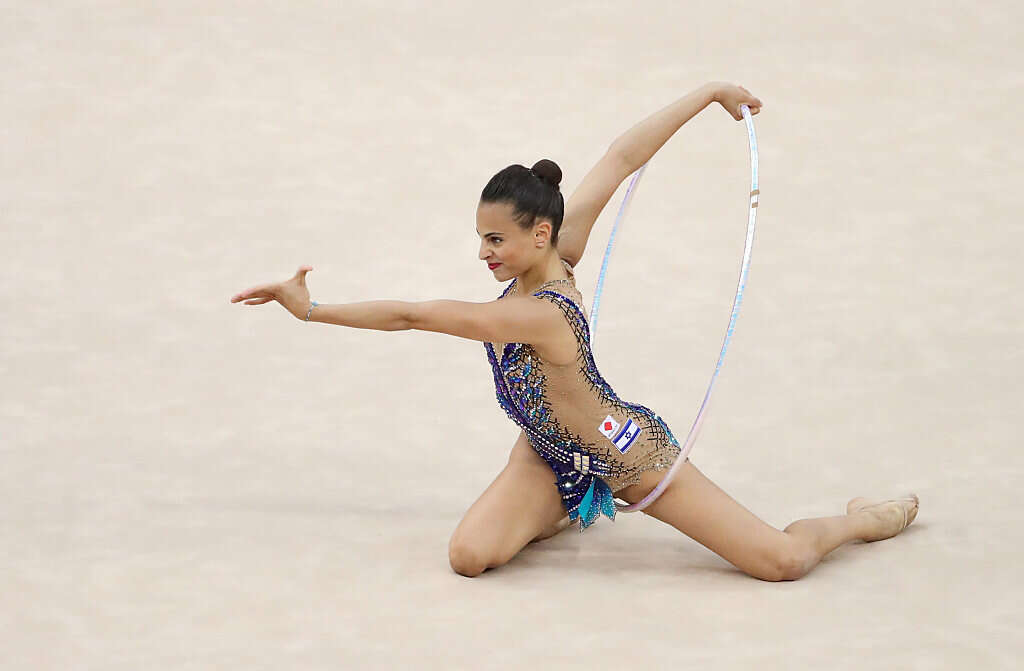"I still can't comprehend it," a tired Linoy Ashram, a newly minted Olympic champion, says with a smile, shortly after she landed in Israel on Wednesday. Her hometown of Rishon Letzion welcomed her with posters bearing her image, as well as those of Olympic medalists Peter Paltchik and Artem Dolgopyat, all across the city.
Follow Israel Hayom on Facebook and Twitter
A giant "Welcome Home" was hung on the modest building where the Ashram family resides. The apartment itself is full of flowers, chocolates and balloons reflecting the pride in the first Israeli woman to win a gold medal in rhythmic gymnastics.

"I'm still living the dream," she says. "Only now, slowly, I'm beginning to understand the magnitude of the achievement.
"I came to Tokyo with the goal of giving my all and experiencing the moment and the feeling of being there, at the Olympics. I knew that, if I did well, I could return with some kind of medal, but I didn't imagine what color it would be. The idea that it would be gold didn't enter my head."
Q: What did you feel after the tense moments of waiting for the score of your rival, Russian Dina Averina?
"I cried. I cried with Ayelet [Ashram's trainer] and I cried when I was joined in an interview by my mom and dad, and I cried in my first conversation with my boyfriend. He told me how proud he was of me and how much he loved me. They were amazing moments. I had a big and long hug with Ayelet. How far we had come up to this moment, how much she had held me.
"We were so happy and we are still so happy. At the medal ceremony, when I saw my friends in the Israeli delegation who had stayed, when I heard them applauding me and singing the anthem, it was one of the most moving moments in my life.
"That night, after they awarded the medal, I didn't sleep at all. Maybe I dozed for 40 minutes. The medal was beside me all the time."
Q: Do you believe in God?
"Yes. I went with Ayelet to the Western Wall before we flew to Japan and I placed a note there. I light the candles on Shabbat, fast on Yom Kippur, and I recited 'Shema Yisrael' to myself before every routine."
Two weeks ago, when she had only just landed in Japan, things were not so rosy for Ashram. On the second night for her and the team which accompanied her, while they were still in the training camp in the city of Ichihara, her coach Ayelet Zussman felt that something wasn't right.
"When we arrived in Japan, a week before the competition, we had white nights," Zussman recalls. "That night, I couldn't sleep because of the jet lag, and I felt that Linoy was also awake. 4:30 a.m., I decided to check when she had last been seen on WhatsApp, and I saw that she was online. Twenty minutes later, I saw that she was again on WhatsApp, and I realized that she wasn't able to sleep.
"We went up on the roof of the hotel. The city was spread out before us, the morning was beginning, and we had a heart-to-heart talk, where she told me about all the pressure she was under."

Q: What did she tell you?
"That she was stressed, that she was afraid to disappoint the country and me as well. I calmed her down and I said, 'You don't disappoint me. The path that you took, that we took, up to now, that is what's important. Here you just have to enjoy yourself.' I told her how much I had faith in her, in her ability, in who she is.
"We remembered her successes over the last few years, and from that night I saw that things were released in her. Everything passed. Her functioning improved, she slept well at night, I felt that she calmed down."
The Olympic champion smiles. "Ayelet senses me every moment, she maybe understands me even more than my mother. Without saying a word, she knows that I'm not falling asleep, she knows what to say to me. She is so considerate towards me.
"On other nights as well, she sits with me right up until I fall asleep. She's really special. Overall, I don't know how I would have got through the corona period without her. I'm sure that it would have been far more difficult to get through this year, the postponement of the Olympics, which basically meant doing another year of training, and competitions, until the pinnacle."
After four days in Ichihara, they arrived at a four-bedroom flat in the Olympic Village in Tokyo. Four women stayed there: Ashram, the brilliant Nicole Zilkman, who also reached the finals, Zussman, and Ela Samofalov, Zilkman's coach. A united team, loving and supportive of one another. Each of them had their own room. They were together when they wanted, and when they needed to, they retired to their bedroom, to be alone for a little.
When they arrived in Tokyo, Zussman enlisted more mental support for Ashram, this time from Ofek (21), her boyfriend.
"I tried, as much as I could, to isolate Linoy from all the noise surrounding her," she explains. "But I knew how important her mobile phone was to her, through which she received support from her amazing family, from her friends and from her boyfriend, who is really salt of the earth.
"I asked him to set an alarm, so that he would call Linoy every night at 1:30 a.m. Israeli time. In Tokyo it was 7:30 in the morning, so that's how she started the day, with a 'good morning' from her boyfriend and a big, sweet smile. I knew how much good it would do for Linoy, and he flowed with me and was brilliant."
As the qualifiers began, Ashram had an error in her first routine with the hoop.
"Ayelet knew exactly what to say to me so that I would focus again," Ashram, who finished in 15th place, climbing to third place by the end of the qualifiers, recalls. She told me 'Linoy, calm down, the goal here is only to reach the final, only the top 10. You have another three routines to get through, to do everything despite what happened.' Afterwards I felt completely focused and full of purpose, and I didn't think of anything apart from the routines.
"I continued only to do my best, with the goal of succeeding in reaching the final."
Q: What did you do in the evening between the qualifiers and the final?
"Myself, the Russian twins and the Belarussian gymnasts stayed in the arena to train. It was only us. I don't know why they came; I came to go over my routines. Afterward I ate dinner, and I spoke with Ayelet about what happened in the qualifiers and about how I can get up to give my maximum in the final. We spoke about how important is to get up with new and good energies."
Eyes on the prize
The morning of the final, Ashram and Zussman woke in good spirits.
"We put on fun and rhythmic songs, we ate breakfast, including pineapple, which was the tastiest thing that I ate there, danced and were happy," Ashram says. "We were together all the time, Nicole, her trainer Ela, Ayelet and myself. I really reached the final in the best spirits possible."
Q: Did you go into the final with the goal of winning the gold?
"No. And I didn't feel like I was on my way to the gold medal. I knew that there was the Russian and the Belarussian, and that every time I was first in the rankings, I knew that it wasn't over.
"During the routines, I understood that I would get a medal, and after the ribbon routine I knew that I was in first place, and then it was insanely stressful. The waiting was one of the tensest moments in my life, and they played music with drumming in the background. But I knew that no matter what, I had an Olympic medal. I was third in many competitions, after the Russians, so the very act of winning a medal was an achievement and I only waited to see the result.
"The tension was enormous. Nicole whispered in my ear: 'We fulfilled a dream, it doesn't matter what the score is, you've won a medal and you've done your best.' We are always like that, we lift each other up, and over the course of the competition, we were a united foursome, together with the coaches. There was never such a strong connection, both between coaches and between gymnasts. We help one another, and Ela, Nicole's coach, also lifted me after the hoop routine in the qualifiers."
Q: What did you think after you dropped the ribbon in the last routine? Did the thought "I ruined it all" go through your head?
"I was pessimistic. I felt that perhaps it would harm my final score and drop me down a bit in the rankings, but I continued because that's who I'm, I give my maximum even when something doesn't go right and there's a hitch. On some level, it even resets me, and that's also what happened with the ribbon. Within a second, I succeeded in returning to myself. After the routine Ayelet said to me that my difficulty level was really high and that the mistake shouldn't harm my score too much, and she was right."

Q: Your main rivals, Russian twins Dina and Arina Averina, didn't take the loss so well. Did you speak with them?
"At the end of the final I approached Dina, who finished second, and I wanted to congratulate her. But she was crying and was in no state to talk. Since then, there wasn't an opportunity to talk or to get in touch at all. At competitions we say hello and wish good luck to one another, and after the competition we congratulate one another at the end."
Q: What do you think about the criticism from Russia, the claims about the judges and the appeal?
"I don't deal with what others are saying. I made my achievement, and it's mine together with Ayelet and the professional team. Whoever wants, they can say what they want, I'm happy with what I achieved.
"In the World Championships in 2018, Dina's ribbon fell, and she still beat me. We didn't say a word. That's the judging, and that's the Olympics. That is, the fairest judging there is. I also heard already that Dina said it's not my fault."
Q: Did you get ugly responses? Antisemitism? Any types of accusations?
"I don't know why it has to reach the level of antisemitism. There are people who think one way and there are people who think another way."
Q: Have you seen the Russian Tiktok challenge which tries to ridicule you?
"I haven't seen it. It's happening because they're not used to it. Their gymnasts always win, and suddenly it happened. Maybe they thought it was in their pocket."
Q: Do you think you proved yourself to those who didn't believe in you?
"I think so."

Q: Before your competition, did you watch Artem Dolgopyat's gold?
"Of course. We sat together in training watched Artem's final, and when he won we jumped up and went wild. We called to congratulate him straight afterwards, it was so great to know that someone had succeeded in winning the gold. We knew that he was capable, he just needed to perform his best routine."
Q: Did his medal encourage you?
"Yes. The thought went through my head that I wanted it too, that I already wanted to compete. Artem had competed, he had already experienced it, and we still hadn't been in the Olympic Village, because we only got there on August 2nd."
Q: Was there a change in the rules that helped you reach your peak?
"From 2017 the rules began to change for the benefit of working with the apparatus. The faster you are, your difficulty level increases, and you can meet the requirements more. Before that, there was a restriction on elements in the routine. In terms of jumping, it was always possible in the past to do more jumps, but in the past, we didn't think of doing it."
Q: And what about the music in the different routines? Is it really chosen so carefully?
"In Tokyo we chose the song Big in Japan, because of the host country of course, and Hava Nagila because of its significance and the fact that its synonymous with Israel. It's a song I've worked with for a year. Apart from that I'm a fan of Beyonce and I had two of her songs. By the way, regarding external appearance, for competitions I do my own makeup and I do my own hair."
Linoy already came to Tokyo with a wardrobe full of medals: silver and bronze medals from the 2018 and 2019 World Championships, a gold, silver and bronze medal from the 2020 European Championships, and bronze medals from the 2017 European Championships – to name a few.
The ones who helped her the whole way are her parents, Oren (49), a standing IDF soldier, and Hedva, a kindergarten teacher, her sisters Chen (25) and Hila (9), and her brother Idan (24).
"My mother believed in me my whole life," she says, "When she brought me to the gym for the first time, she said to my trainer, 'You'll see, this will be the Israeli Nadia Comaneci.' The coach thought that my mother didn't understand, because Comaneci was an instrumental gymnast, but my mother knew that. She only said it because of her achievements.
"When I was 13, I went through a crisis. I'd had enough and I quit, and I remember that suddenly I didn't understand why I needed all this. I felt that I deserved to be someone different. I decided that I wanted to move to swimming, but after a month I was bored of spending all day in the water. I felt that something was lacking, that it's not what I want, so I went to my mother and cried for her to take me back to gymnastics."
Q: In Tokyo, were you in close contact with your parents?
"I tried to send them pictures and to speak with them. I prefer pictures on WhatsApp and not voice calls, because they understand me, and before competitions, they give me space and try to disturb me as little as possible. They are afraid that it will prevent me from focusing but when I send something they immediately respond."

Q: Would you have preferred that they would have been with you there? And in general, that competitions would take place in front of a live audience?
"Yes, a competition with fans is more fun. But I was concentrated on myself and the competition, so it didn't change me. Of course, if it had been possible, I would have wanted my family coming to watch.
"I didn't think my father would come to the European Championships. He took me to the airport when he was upset, and then he discovered that they opened half a stand and he called to organize tickets. After two days, just like that, my dad, mum and sister Hila suddenly landed there."
Q: Your family couldn't go to Tokyo, but the media, who assembled at their home during the final, captured their excitement.
"The night before the final we didn't sleep, nor the night before that," her father Oren says. "We sat a lot watching television, we did sports and we tried everything to deal with the pressure and to calm the nerves.
"Before the final I sent Linoy one message: 'We believe in you and love you, do what you know to do and whatever happens will happen.' The Olympics was always her dream, but until eleventh grade we said to her 'first of all studies.' When she reached eleventh grade Hedva said to me "Oren, let go. Let her do what she loves,' and in eleventh grade I let go, I let her do what she was good at."
Q: Did you worry when she dropped the hoop in the qualifiers?
"We were very anxious. I didn't worry, I thought that she was stressed and we didn't know exactly what she was going through, but she improved very quickly, got back to herself and her smile and was enjoying herself in the arena."
Q: What did you feel while watching the final?
"We were stressed, but when I saw that she was in good spirits I knew that she was going to win a medal. We didn't know which medal, but we knew she would achieve something. We understand our girl even with our eyes closed.
"Now I'm euphoric. Calm, and I have time for myself. There's time until the next Olympics, life is good. If Linoy decides to continue, we'll fly to the next Olympics. Of course, even now I would have flown if it had been possible, even at the cost of catching corona."
Q: You obviously also supported her financially.
"We were always there to support her, to take her to training and fetch her – myself, Hedva, grandma and grandpa and my son, like a taxi firm. We bought the costumes, we took out loans and did everything under the heading "Linoy."
"Before she was successful at an international level, and the union took care of her and sponsors took interest, it was all on us. From six years old until she was 14, for eight years, we paid for everything: clothes for competitions, flights and hotels. Everything costs thousands of shekels. In short, we spent a lot of money, hundreds of thousands of shekels."

Q: Did she ever think about quitting? That maybe it isn't worth it?
"No. She always wanted to do gymnastics, with or without injuries. She wanted to continue at any cost, nothing bothered her. Six weeks before the European Championships, she pulled off a routine with a torn meniscus. Two days before she returned to competition and won a medal. That's her stubbornness, maybe it's from me."
Ashram still hasn't had a chance to go through the thousands of messages she received on social media, and just like what happened with the bronze medallist Avishag Samberg, the number of people following her on Instagram has soared since the victory.
"Until the final I had 64,000 followers, now I have 180,000 and it's really fun for me," she smiles. "It really moved me to speak with President Herzog and Prime Minister Bennett, and to receive thousands of messages and shares. I also saw the greeting from Shalom Michaelshwilli in the style of the Russian coach, and it made me laugh.
"This attention is nice and it shows that many people know me, that I'm in their consciousness and that they appreciate me and are pleased by my success. On the other hand, I'm also shy, and it doesn't suit me to be famous. I like the anonymity and the privacy."
Q: Is that why you blocked your Instagram to responses?
"I blocked mainly because they said to me that it would be better if not everyone was able to follow me. Now I have to approve everyone who wants to follow me and I have thousands of messages and requests waiting for me. Does someone want to come and approve instead of me?"
Linoy gives special credit for her achievement to her coach, Zussman (42), and the whole professional team, which includes her personal manager Ophir Even and the physiotherapist Natali Bertler (36), who have accompanied Ashram and Zilman over the last few years on a daily basis.
"Ayelet was everything for me," Ashram says, "she did everything for me and she gives her all to this relationship. The relationship between a coach and gymnast becomes a relationship like a second mother, or a big sister. I'm not at home most of the time, but with her, so she is the first person that turn to, and she helped with everything."

"Linoy began the qualifying stages very badly," she explains, returning for a moment to the professional side of things. "She failed in the hoop apparatus, but that didn't surprise me at all. I knew that it could happen to her at the beginning, because it also happened in the past, but I also knew that she would recover from it. Yes, when she was in 15th place it stressed me out, but I told her: 'You're Linoy Ashram, and you're capable of more. It's money time and you can do it.
"I wasn't angry with her, because I knew that it would lift her and she would stand up straight, sharpen her senses and get back to herself. Even before the competition I knew that we had created a big gap with the other competitors, thanks to the difficulty level Linoy was carrying out in her routines, and I had no doubt that she would be in the final.
"After the hoop routine, Linoy rose up like a giant and proved from what kind of champion's material she was formed. I was happy because the goal was the final and I knew that from there everything was open. At the end of the qualifiers she stayed to train, ate and went to sleep at ten at night. I peeked into her room to see that she was really sleeping."
Q: How did you feel after the victory?
"We both cried, we looked at one another and spoke with our eyes, without words. I said to her basically: 'You did it!' She looked at me and said with her eyes, "I'm an Olympic champion!" We were on cloud nine.
"Linoy is a super-sportswoman, what she has done is so fantastic. After her bad start in the qualifiers, she proved what a great sportswoman she is, and even more than that."
"In the final I was calm, because I saw that Linoy was sharp and focused. She did excellent routines with a high difficulty level."
"And I'll tell you something else. We prepared for every scenario, for every fall – God forbid! – in one of the routines and how to get up immediately and continue. But when Linoy lost her ribbon in the last routine, and I saw how she immediately got up and continued her amazing routine, I understood just how phenomenal she is. It was such an amazing and moving sight. For a moment I worried that she would say to herself 'I lost the medal' and that it would impact her, but then I saw her spectacular execution after the error and I knew I had a champion."
Subscribe to Israel Hayom's daily newsletter and never miss our top stories!
Ashram's journey to Olympic gold also received a significant boost from her sponsors – door market giant Rav Bariach, Bank Hapoalim, global hygiene products brand Always and sports colossal Adidas, which were joined by foods maker Talma, choosing Linoy as their rep for the brand "Cornflakes of Champions."
"All my sponsors always congratulated me, wished me success and asked me if I needed something. I was really lucky to get them," she says.
'I'm proud of my origins'
Between the training and the competitions, and especially with the relationship and the strict nutritional regime, Ashram doesn't have much time for hobbies or other pleasures in life, but she really tries.
Q: What is your guilty pleasure?
"Now I eat chocolate, but I still have to keep an eye on my weight and my figure. Now I can eat a few more things, but I'll still watch myself. I don't want to get fat or to swell up. At the moment I'm on a break and on holiday until I decide what's next. For the moment I'm taking a couple of weeks off, and then I'll speak with Ayelet. It's too early to speak about the Paris Olympics in 2024, I'm still experiencing the moment from Tokyo."
Q: Do you have time for a social life? To meet with friends? To watch television?
"Until now I was deep into training and the Olympics, but I would sometimes go out. During holidays, I travel in Israel with my boyfriend and with my friends or watch television shows. I really like Grey's Anatomy; I binged it and watched all 17 seasons."
Q: Not everyone knows that you have a boyfriend. Do people chat you up on social media?
"It happens, but I don't answer them."

Q: In the world of gymnastics, they call you the "Black Panther." How did you get that nickname?
"When I was 14, I took part in a competition, and one of the support staff of an Azerbaijani sportsman called me the 'Black Panther,' because everyone apart from me was white and Russian. He said that I was the first to arrive at the hall and the last to leave, and I really was there all day and night. When they told me about the nickname, I laughed."
Q: Does a nickname that reflects on the color of your skin bother you?
"Definitely not. I love the color of my skin. I'm proud of my origins, the place where I'm from and in who I'm. My father has roots in Yemen and my mother is of Greek origin, and both of them were born in Israel."
"I show my Israeliness and I love that I'm different from other gymnasts, that I have something different in me, something refreshing, different. My uniqueness also finds expression in the color of my skin and my look, because it's clear that I'm not Russian, and I think that it proves even more that, despite not being Russian, I'm succeeding in making achievements. Both in Israel and abroad I haven't encountered racism, only sympathy.
"I love my nickname and see a black panther as a strong and warlike animal, an animal who doesn't give up, who is always found above everyone and, if needed, can also devour."




